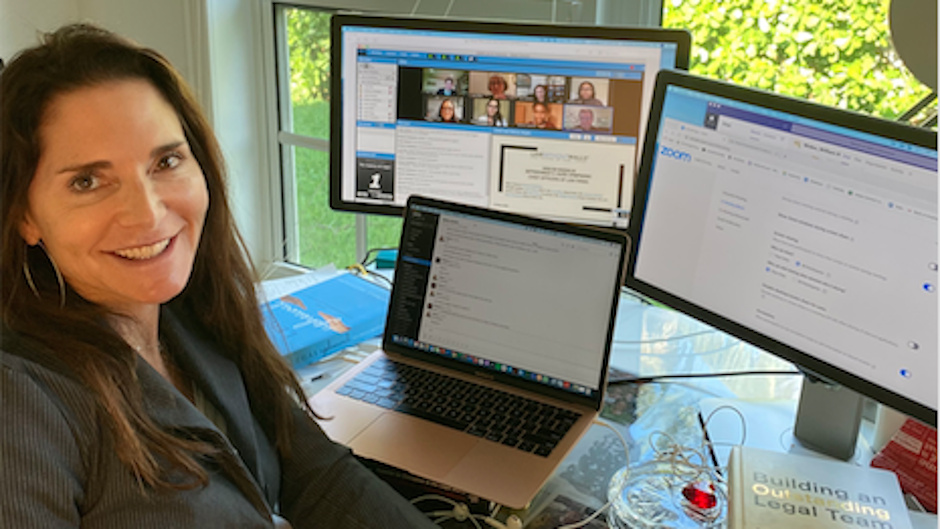Professor Michele DeStefano, Founder and Director of LawWithoutWalls, the 10-year-old part-virtual, collaborative academic model that unites students, faculty, and practitioners from around the world to innovate legal education and practice, helped lead Miami Law’s transition to online learning during the COVID-19 pandemic.
How was Miami Law positioned to transition to teaching online?
I think we are better positioned than other law schools. First, the faculty and administration are nimble and unafraid of piloting new ideas. One of the most unique attributes of Miami Law over other law schools is the speed with which it creates and implements new ideas and initiatives. There has been an abundant level of innovative programming at the law school over the last 10 years, including LawWithoutWalls (LWOW), Scott Rogers’s Mindfulness in Law program, Dan Ravicher’s Startup Practicum, Andres Sawicki’s Business, Innovation, Law, & Technology (BILT) concentration, Mary Anne Franks’ Cyber Civil Rights Initiative, to name a few.
Second, Miami Law was a first mover in online education. Over 10 years ago, when LWOW began, it was the first blended, part-virtual online experiential program in the law marketplace. We started with six law schools, and now have had students participate from over 35 law and business schools around the world. Over seven years ago, we created LWOW X, which is an all-virtual program mirroring the original LWOW model. Given this experience and the COVID-19 pandemic, I wanted to give back to the universe. So, every Wednesday, I am hosting live, virtual-work training sessions (to teach anyone in the LWOW community (or friends of the LWOW community) best practices for virtual interaction of all kinds (education, work, meetings, conferences, etc.).
What prepared you for taking on the rapid pivot to online education?
I laughed when I read this question because I didn’t have to take a “rapid pivot” to online education because I was already there. In LWOW, I have been teaching and working virtually (synchronously and asynchronously) since its inception; it is one of the reasons that LawWithoutWalls has its name, (i.e., a virtual space “without walls”). Of course, there are other reasons it is called this too, (i.e., to break down the “walls” and barriers in law, etc.). It is amazing for me to think about the fact that when I first started LWOW, Google Drive didn’t exist; it was Google Wave.
I am fortunate because one of the best benefits of LWOW for me, as a professor today, is that I have worked virtually in almost every format and across multitudes of platforms. I have led three-day, 48-hour, half-day, and two-hour workshops online using live chat, and video, and break-out rooms. I have led almost 100 “live” webinars with hundreds of people in attendance. I have taught thousands of law and business school students and professionals from around the globe both in real-time and pre-recorded. Also, in leading/teaching over 230 multi-disciplinary teams of lawyers, business professionals, and law and business students on a four-month virtual innovation journey, I have learned best (and worst) practices. To that end, I have learned firsthand that there is a right and wrong way to teach, work, and collaborate virtually.
How much of the LWOW model scales to converting the more than 300 law classes to online distance teaching and learning?
There are many facets of the LWOW model that can be converted to online distance teaching and learning. However, the most important part of the model is the emphasis it places on creating the right virtual interaction culture. Given that the hardest part about going virtual is not the tech or the tools but instead the culture and mindset, an essential element of the LWOW model is its focus on individual and collective accountability and norm creation for virtual work and education.
In LWOW, we teach that there are two types of individual accountability for connecting that everyone needs to commit to for effective individual work and effective virtual teaming and learning. First, we need to actually be able to connect from a technological standpoint. True, sometimes the tech gods do not enable us to have a strong connection with video and audio. In those moments, we need to forgive fast and often because our teammates are as upset as we are. Other times, however, we have not done what we should have prior to the meeting to ensure that our tech works so that we are physically present. The second type of connecting is the kind that is oh-so-hard virtually: connecting with focus and staying mentally present with energy, which is why we always keep our videos on during all virtual meetings).
With respect to collective accountability, there are also two types. First, it is important to co-develop the behavioral norms and culture of virtual interaction so that our virtual place is what Ray Oldenburg calls “a third place,” which is not the home or the office. It’s important that this third place has rules of engagement regarding which tools are used, when they are used, and how they are used. The second type of collective accountability involves commitment. In LWOW, we believe that the one way to ensure that expectations are met is to write out and agree to the specific protocols and norms related to the “virtual” part of working/learning—and provide training on it. Each team is required to create a P.A.C.T. that sets out the P-Purpose of virtual work and outlines the A-Agreements we make related to the C-Creative Cadence (how we work) and the T-Timing of virtual meetings (including, when we meet/work virtually, acceptable response times, etc). The P.A.C.T. serves as a commitment to the virtual community culture based on open discussion about preferences and work styles and a written commitment.
I am sure it isn't a one-size-fits-all model. What has surprised you?
I have been so pleasantly surprised by the energy and earnest effort of all of my Miami Law colleagues to get online, fast, and right—right away.

